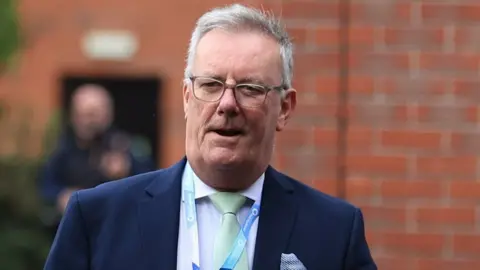Nesbitt announces funding to help pay National Insurance rise
 PA Media
PA MediaA funding package to help health employers mitigate against the rise in National Insurance costs has been announced by Health Minister Mike Nesbitt.
The Department of Health said the increase in National Insurance contributions for employers has added in the region of £140m to its financial pressures this year.
That total includes about £100m in relation to directly employed staff in health trusts and other statutory organisations in the health system.
Nesbitt has agreed that the funding package, which amounts to a projected £40m, will also help support non-statutory providers of health and social care, such as social care providers and hospices.
Family healthcare providers - such as GPs, dentists, community pharmacies and opticians - are also included in the funding.
The Department of Health said £3.5m has been earmarked for GPs to help pay for their National Insurances costs, as detailed in contract discussions with GPs this year, but that the British Medical Association (BMA) has asked its members to reject the contract offer.
The BMA decided to ballot its members after it said negotiations had stalled on the 2025-26 GP contract.
The result of the ballot is expected soon.
Of the other family health service providers, £4m has been earmarked for community pharmacies, £2.5m for general dental services and £1m for general ophthalmic services.
Why is the health minister acting on National Insurance?
Nesbitt said his three-year plan for health and social care includes "stabilisation of services amid the current severe financial pressures", and that helping with rising National Insurance bills "very much fits in with the stabilisation objective".
"It is crucially important to support providers who have been hit with additional costs for reasons entirely outside their control," he said.
"I have therefore decided to take a financial hit rather than leave healthcare providers to deal with the UK government's hike in National Insurance contributions by themselves.
"That would have been deeply unfair and would have been detrimental to health and social care provision."
Community Pharmacy Northern Ireland (CPNI) said it welcomed the £4m in funding coming to its members.
Gerard Greene, the organisation's chief executive, said the increased costs "fall directly on pharmacy owners to cover, while trying to balance the books in the face of other mounting financial pressures".
